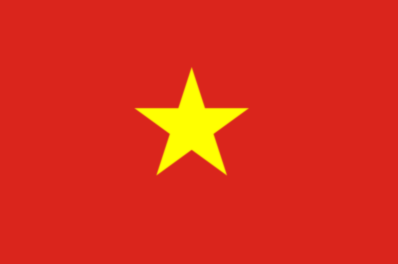World
Vietnam : Independence, Freedom, Happiness

Vietnam is a country located in Southeast Asia with a rich and complex history that spans over 4,000 years. The country has been shaped by multiple kingdoms, foreign invasions, wars, and conflicts, and its culture and traditions are a unique blend of both Eastern and Western influences. In this article, we will explore the history of Vietnam from its earliest origins to modern times.
Early History of Vietnam:
The earliest recorded history of Vietnam dates back to the Bronze Age, with the Dong Son culture. The Dong Son people lived in the Red River Delta area, which is now present-day North Vietnam, and were known for their advanced metallurgy techniques, including bronze casting and ironworking. They were also skilled in agriculture, rice cultivation, and fishing.
In the 3rd century BC, the Au Lac Kingdom was established by Thuc Phan, which was later renamed Van Lang. This kingdom was ruled by a series of kings, including the famous An Duong Vuong, who is credited with building the Co Loa Citadel, a magnificent fortress made of earth and stone.
In 111 BC, the Chinese Han Dynasty conquered Vietnam and ruled it for over a thousand years, during which they introduced Confucianism and Buddhism to the region. Despite this long period of Chinese domination, Vietnam maintained its unique culture and identity.
The Rise of Independent Kingdoms:
In the 10th century AD, Vietnam started to break away from Chinese rule and establish independent kingdoms. The most notable of these was the Ngo Dynasty, which was founded in 939 and lasted until 965. The Ly Dynasty followed, which was known for its cultural achievements, including the creation of the Vietnamese script, known as Chữ Nôm.
The Tran Dynasty came to power in 1225, and it was during this period that Vietnam repelled several Mongol invasions led by Kublai Khan. The Tran Dynasty was followed by the Le Dynasty, which was established in 1428 and lasted until 1788. This dynasty was known for its expansionist policies and cultural achievements, including the construction of many impressive temples and pagodas.
The French Colonial Period:
In the 19th century, Vietnam came under the control of the French, who established their colonial rule in the country. The French introduced Western education, architecture, and infrastructure, but their rule was oppressive and led to a growing resistance movement.
In 1940, during World War II, Japan occupied Vietnam and overthrew the French colonial government. However, the Vietnamese people continued to resist foreign rule, and in 1945, the Viet Minh, led by Ho Chi Minh, declared Vietnam’s independence.
The Vietnam War:
The Vietnamese struggle for independence led to a long and devastating war that lasted from 1955 to 1975. The conflict was fought between the Communist government of North Vietnam, supported by the Soviet Union and China, and the United States-backed government of South Vietnam.
The war was marked by intense fighting, bombings, and other atrocities, and it resulted in the deaths of millions of Vietnamese people. In 1975, the North Vietnamese army overran Saigon, the capital of South Vietnam, and the country was reunified under Communist rule.
Modern Vietnam:
Following the end of the war, Vietnam underwent a period of economic and political reform. The country opened up to foreign investment, and it has since become one of the fastest-growing economies in the region.
Vietnam has also made great strides in education, healthcare, and infrastructure, and the country has become a popular tourist destination, known for its beautiful landscapes, rich culture, and friendly people.
Conclusion:
Vietnam’s history is long and complex, with multiple kingdoms, invasions, and wars that have shaped its culture and identity. Despite this tumultuous past, Vietnam has emerged.
Racism is a global issue that has plagued various countries, including Vietnam. Racism in Vietnam is a complex and nuanced issue that is often overlooked due to the lack of data and public discourse. However, the issue of racism in Vietnam cannot be ignored, as it affects both Vietnamese people and foreign residents living in the country.
Vietnam has a predominantly homogenous population, with 85% of the population being ethnic Vietnamese. The remaining 15% comprises various ethnic groups, including Chinese, Khmer, and Hmong. Unfortunately, these ethnic minorities are often subject to discrimination and prejudice due to their physical appearance and cultural practices.
Chinese-Vietnamese relations have been complicated throughout history, with tensions heightened during the 1979 border war. This has contributed to a longstanding prejudice against ethnic Chinese in Vietnam, who are often labeled as “foreigners” despite their long history in the country. Chinese-Vietnamese individuals are often subject to discrimination and negative stereotypes, with some experiencing limited job opportunities and social exclusion.
The Khmer ethnic group in Vietnam also experiences racism, with many Khmer people residing in the Mekong Delta region. Khmer people are often stereotyped as “backward” and “uncivilized,” and their language and cultural practices are often viewed with disdain. This has led to a lack of access to education and healthcare, as well as limited job opportunities and political representation.
Foreign residents living in Vietnam also experience racism, with many being subject to negative stereotypes and discrimination based on their race and nationality. This is particularly evident in the job market, where some companies may prefer to hire native Vietnamese speakers over foreign residents, regardless of their qualifications.
In recent years, there have been some efforts to address racism in Vietnam. In 2013, Vietnam passed the Law on Ethnic Minorities and implemented policies to promote diversity and equality. However, implementation of these policies has been slow, and racism continues to be a pervasive issue in the country.













You must be logged in to post a comment Login